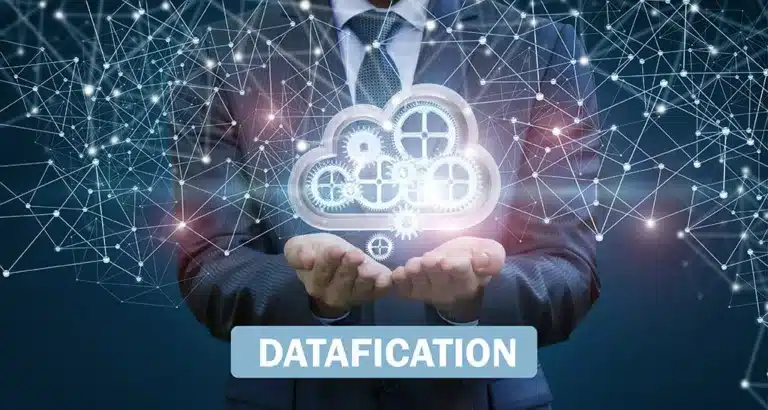Introduction
Datafication technology is reshaping the world as we know it, revolutionizing how we collect, analyze, and leverage data in various aspects of our lives.
Iwe will delve into the fascinating realm of datafication, exploring its definition, evolution, applications, and the profound impact it has on individuals, businesses, and society as a whole.

Understanding Datafication Technology
Datafication technology refers to the process of converting various aspects of our daily lives, activities, and interactions into digital data.
It involves the systematic collection, storage, and analysis of data generated from both digital and analog sources.
This transformation of the physical world into digital information has far-reaching implications, and it forms the foundation of many modern innovations and solutions.
The Evolution of Datafication
Datafication has evolved significantly over the years, fueled by advances in technology and the proliferation of digital devices. Let’s trace its evolution:
Early Data Recording:
The concept of datafication can be traced back to ancient civilizations, where rudimentary methods were used to record data, such as tally marks on clay tablets or papyrus scrolls.
Industrial Revolution:
The advent of the Industrial Revolution marked a significant step in datafication.
The mechanization of various processes led to the systematic collection of data related to production, logistics, and inventory.
Digital Revolution:
The digital age, characterized by the rise of computers and the internet, accelerated datafication.
Moreover Businesses began digitizing records, enabling the collection of vast amounts of data.
Smart Devices
The proliferation of smartphones, IoT devices, and wearable technology has led to the generation of real-time data on an unprecedented scale.
More importantly these devices capture data related to location, health, preferences, and more.
Big Data and Analytics:
The emergence of big data technologies and advanced analytics tools has empowered organizations to harness the potential of large datasets, extracting valuable insights and making data-driven decisions.
Applications of Datafication Technology
Datafication technology has found applications across various industries and aspects of life, bringing about transformative changes and innovations:
Healthcare:
Electronic health records, wearable devices, and health apps collect patient data, improving diagnosis, treatment, and healthcare management.
Finance:
Financial institutions use datafication to assess risk, detect fraudulent activities, and personalize financial services for customers.
Retail:
Data-driven insights enable retailers to optimize inventory management, personalize marketing, and enhance the customer shopping experience.
Transportation:
Datafication is at the heart of navigation apps, ride-sharing services, and autonomous vehicles, making transportation safer and more efficient.
Education:
Educational institutions use data analytics to track student performance, personalize learning, and improve educational outcomes.
Smart Cities:
Cities leverage datafication to enhance urban planning, optimize resource allocation, and improve public services.
Entertainment:
Streaming platforms use data to recommend content to users, while the gaming industry personalizes gaming experiences based on player behavior.
The Impact of Datafication on Society
The widespread adoption of datafication technology has profound implications for society:
Data Privacy:
The collection and use of personal data raise concerns about data privacy and security.
Striking a balance between innovation and safeguarding individual privacy is a critical challenge.
Digital Divide:
The unequal access to technology and digital resources can exacerbate social and economic inequalities.
Bridging the digital divide is essential for ensuring equitable access to the benefits of datafication.
Empowerment:
Datafication empowers individuals with insights into their own behavior and choices. It enables informed decision-making and self-improvement.
Business Transformation:
Organizations that effectively harness datafication gain a competitive edge. They can anticipate market trends, tailor products and services, and optimize operations.
Public Policy:
Policymakers grapple with regulatory frameworks to address data-related issues, including data ownership, consent, and the responsible use of data.
Transitioning Towards Responsible Datafication
To navigate the datafication landscape successfully and responsibly, certain key principles and practices should be embraced:
Ethical Data Use:
Organizations must adopt ethical guidelines for data collection and use, ensuring transparency and consent from individuals.
Data Security:
Robust data security measures are essential to protect sensitive information from breaches and cyber threats.
Data Literacy:
Promoting data literacy among the general population empowers individuals to make informed decisions about their data.
Regulation and Compliance:
Governments and regulatory bodies should develop and enforce data protection and privacy laws to safeguard individuals’ rights.
Innovation:
Encouraging innovation in data analytics and technologies can lead to breakthroughs that benefit society while respecting ethical boundaries.
Education:
Educational institutions should incorporate data science and digital literacy into their curricula to prepare students for a data-driven world.
The Future of Datafication Technology
As datafication continues to evolve, several trends are expected to shape its future:
AI and Machine Learning:
Artificial Intelligence and machine learning will play a pivotal role in extracting meaningful insights from large datasets, automating decision-making, and enhancing data-driven applications.
Blockchain:
Blockchain technology has the potential to revolutionize data security and ownership, enabling individuals to have more control over their data.
Edge Computing:
Edge computing will reduce latency and enable real-time data analysis at the source, particularly crucial for IoT applications.
Quantum Computing:
Quantum computing could unlock new possibilities in data analysis, solving complex problems at unprecedented speeds.
Personalization:
Datafication will continue to drive personalization in various aspects of life, from healthcare to entertainment, tailoring experiences to individual preferences.
Conclusion
Datafication technology is ushering in a data-driven era, transforming industries, empowering individuals, and presenting both opportunities and challenges.
Embracing datafication responsibly, with a focus on ethics, security, and education, is essential to harness its full potential for the betterment of society.
As we navigate the evolving landscape of datafication, it is crucial to strike a balance between innovation and safeguarding individual rights and privacy.
In doing so, we can harness the transformative power of data to build a brighter and more data-informed future for all.
